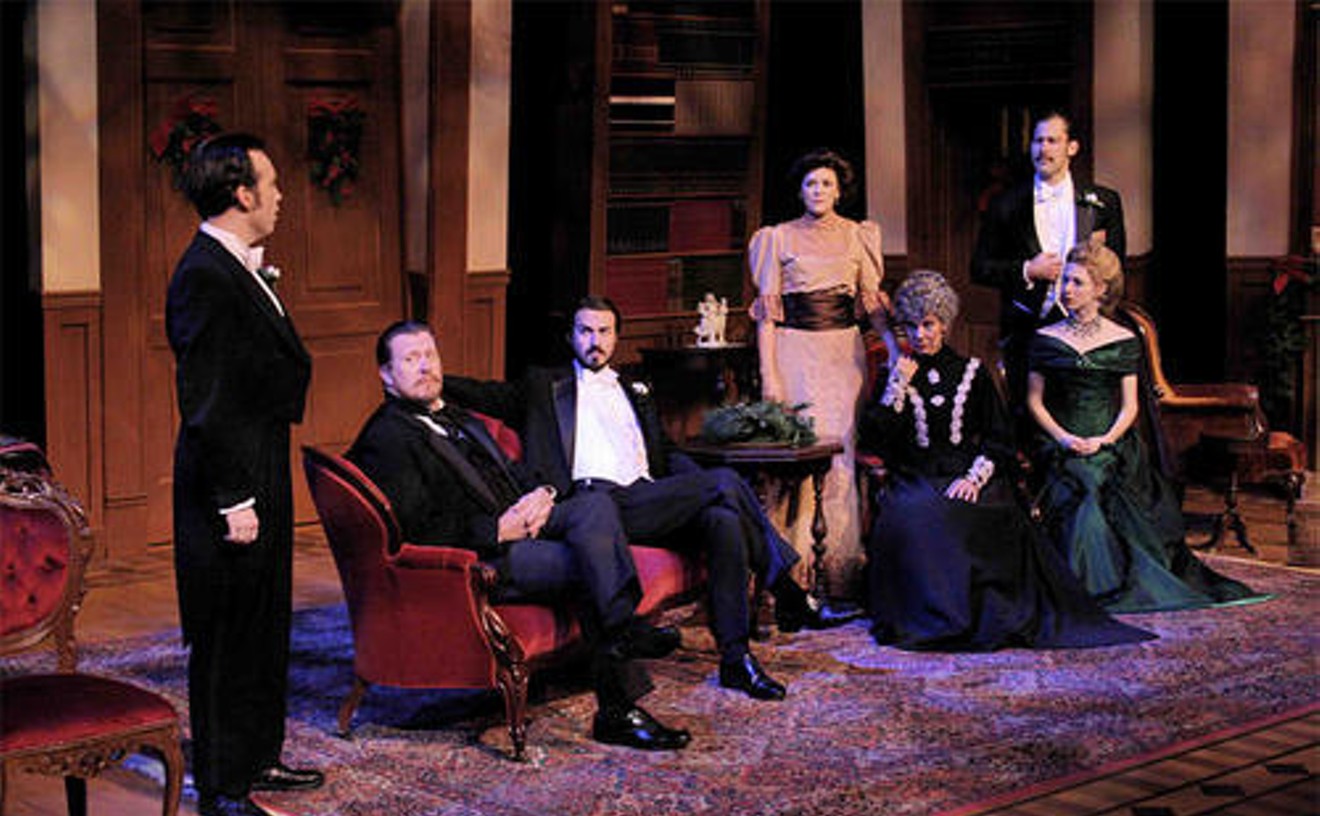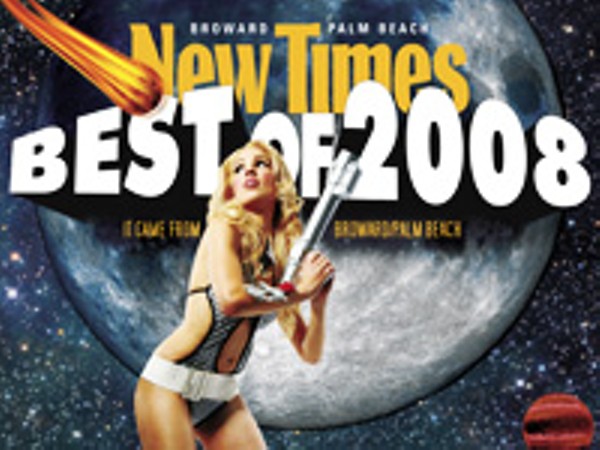South Florida should be very proud. In any other year, Thom Paine, The Clean House, 9 Parts of Desire, or The Fourth Wall would have all been shoe-ins for Best Play. Alas, this was a year of staggering theater, and no show was quite so staggering as Doubt, probably the best play John Patrick Shanley ever wrote. Caldwell Theatre gave it the cast it deserved, and people filing out of the theater were heard to wonder aloud not only about the play's real meaning but about the purpose of theater in general. This year's other great plays were moving or scary or funny, but Doubt made you doubt — not just what happened in the show, but how certain you can be of anything. Shanley's script follows an old-school nun as she seeks to discover whether or not her parish priest is molesting a young pupil. At times you believe that he isn't, that he is, that he might be — and, in a few weird moments of cognitive dissonance, you believe all of these things at the same time. If peeling away our easy grasp on fact versus fiction isn't the greatest thing a show can do, we don't know what is.
Best Reggae Sound System
Black Chiney
Few reggae sound systems around the country gig as often as our own Black Chiney. While perched here in South Florida, the five members of Black Chiney work nearly every corner of the globe, from Europe to Asia to the Caribbean and beyond, keeping up a schedule as rich as the topnotch reggae jams they spin at their parties. Not only are they one of the most accomplished and talked about reggae sounds in the country, they also make impossibly good mixtapes combining hip-hop and dancehall, making them an anomaly within their own industry. At the head of this sound system is Supa Dups, the Buddha-like long-time reggae veteran who handles most of the crew's production and booking. He's the chief architect behind a host of popular dancehall riddims like the Dr. Bird, the Drumline, and a slew of other beats that mainstream artists such as Nina Sky, Collie Buddz, Estelle, and others have used recently. That alone brings enough notoriety to the crew. But like Voltron, this sound system has various components and its other selectors — Bobby Chin, Walshy Fire, Willy Chin Remix, and Dinero — are equally nice in the dancehall. What's best though is that with all the cockiness and bravado attached to dancehall music, the members of Black Chiney are typically the lowest-key guys in the room. They up the ante for what reggae selecting is all about.
Best Rock Band
Big Bang Radio
Coming straight out of Palm Beach County, this quintet kicks ass like no other straight-ahead rock group in Florida. They can be loud and fast when they want to, but lead singer Mike Sanchez always remains easy to understand, making their live shows a treat. This is the same group that made it to the finals of Bodog's Battle of the Bands television show last year and canned their former lead singer on national TV. While that drama probably helped draw more attention to the band, it's the group's music that converts new listeners one by one. Their debut album, To Mars From Babylon, has that rare blend of white collar production and blue collar wallop. You can drink to these songs, get laid to these songs, and feel inspired by them. The drums, bass, and guitars are all tight. And you can always dance your troubles away at a Big Bang Radio show.
Best Set Design
Tim BennettThe Clean HouseCaldwell Theatre

The Clean House was a play about the importance of getting filthy, and no play in the last year or two has enjoyed a set that so perfectly captured its theme. Beginning as the oppressively clean domicile of a couple of doctors, by the end the stage is an irreparable mess — or so it would appear; since they had to repeat the process several times a week, the irreparability of the cast's wanton destruction was probably an illusion. At one point, the house gave way to a two-story beach bungalow hiding behind it: as one of the doctors and his paramour partied on the bungalow's balcony, they loosed both symbolic and actual detritus on the ever-filthier home below. Later, the house suffered the further indignity of having an uprooted yew tree dragged through the living room. The place was so sparklingly sterile at the beginning that its slow destruction was physically painful to watch, like seeing somebody get deflowered. But it was also liberating. Which was the point.
- 7901 N. Federal Highway, Boca Raton, 33487 Map
- 561-241-7432
- www.caldwelltheatre.com
Best Solo Exhibition
"Georgia O'Keeffe: Circling Around Abstraction"

Georgia O'Keeffe is one of those artists we think we know oh so well and hence often take for granted. Gigantic close-ups of flowers? Check! Bleached-out cattle skulls? Check! And it was just such assumed familiarity that made the Norton's "Georgia O'Keeffe: Circling Around Abstraction" such a delightful surprise. Working from a deceptively simple common denominator — abstract works making use of more or less circular forms — curator Jonathan Stuhlman (formerly of the Norton) assembled a career overview that let us see O'Keeffe anew. The show, which originated at the Norton and moved on to the museum devoted to the artist in Santa Fe, partook freely from O'Keeffe's many subjects, including those ubiquitous flowers as well as landscapes and still lifes, with some especially inventive takes on the latter among the highlights. The exhibition gave us a well-rounded portrait of a major American artist who was consistently ahead of her time throughout a long, productive career that spanned the better part of a century.
- 1451 S. Olive Ave., West Palm Beach, 33401 Map
- 561-832-5196
- www.norton.org
Best Supporting Actor
Terrell Hardcastle DoubtCaldwell Theatre

As Father Brendan Flynn in John Patrick Shanley's Pulitzer Prize-winning Doubt, Terrell Hardcastle had what looked like the time of his life screwing mercilessly with the heads of his audience. Doubt is a play about, well, "doubt" — specifically, the doubt of a nun considering what to do about a priest whom she suspects is molesting a pupil. She isn't quite sure, of course, and neither are you. There's the rub. But you think you're sure, over and over again: big bad Sister Aloysius comes out, makes her case against the priest, and you're totally sold. You're ready to pull the bastard's eyes out. Then he appears, full of love and light and seeming good sense, and within minutes you can't imagine he's anything but the kind, wise, virtuous man he says he is. Any good actor can make an audience believe in him. Doing this after an audience has already made up its mind not to believe in him — that's not talent, but greatness.
- 7901 N. Federal Highway, Boca Raton, 33487 Map
- 561-241-7432
- www.caldwelltheatre.com
Best Supporting Actress
Pat BowieDoubtCaldwell Theatre

Doubt had the two trickiest supporting roles of the theater season, and in retrospect it's hard to imagine Pat Bowie's part going to anyone else. Bowie played Mrs. Muller, a black mother in the 1960s Bronx, whose young son may or may not have been molested by a parish priest. Bowie's sole scene came when she was summoned to the office of the school's headmistress, the very-stern Sister Aloysius. Aloysius voiced her suspicions, and Mrs. Muller, rather than being shocked or horrified, told the nun to mind her own business. Apparently, Mrs. Muller believed there were worse things than being diddled by a man of the cloth. Aloysius was horrified, and so was anybody who happened to be sitting in the audience. But in the 10 minutes that followed, Mrs. Muller became a genuinely sympathetic character — so convincing was Pat Bowie that you figured plenty of theatergoers must have come around to her side.
- 7901 N. Federal Highway, Boca Raton, 33487 Map
- 561-241-7432
- www.caldwelltheatre.com
Best Theater For Drama
Palm Beach Dramaworks
Palm Beach Dramaworks is a tiny company in a tiny space that, thanks to its Palm Beach subscription base, has production values to rival most theaters three times its size. And for serious drama, intimacy matters. Watching The Voice of the Prairie at PBD, you get the sense that you're in a cramped, dark studio watching a radio play produced live. When they did The Fourth Wall, you truly felt like you were hidden behind the fourth wall of somebody's living room. PBD often lays hands on some of the best actors in the region, and this closeness lets you see more of their work than is possible at any other venue: the subtle darting of Todd Allen Durkin's eyes; the twitch at the corner of Nanique Gheridian's nervous smile. These are small things, but they add a whole new layer to every good show PBD puts out there. Word is, the company is currently seeking a new home. Let's hope it's not too big.
- 201 Clematis St., West Palm Beach, 33401 Map
- 561-514-4042
- www.palmbeachdramaworks.org
Best Tribute Artist
Hot Rod
South Florida has its bevy of tribute artists, but to be the best you can't just sound like the real deal. You can't just look like the fella either. You have to have that special something the artist doesn't have. In the case of Hot Rod, our own local Rod Stewart tributist, that special something comes out most prevalently after a few glasses of chardonnay. Anything can happen at a Hot Rod show: He might perform one-handed push-ups, do a little freestyle jazz fluting, or even flirt simultaneously with every woman in the room — you simply never know what to expect. Antics aside, Hot Rod has tapped into a musical treasure trove with Rod Stewart songs like "Maggie May," "Have I Told You Lately," and "Do Ya Think I'm Sexy?" — jukebox gems that are the perfect tunes to unite any crowd, anywhere.
Best Venue to See Stand-Up
Improv Paradise Live
Let's face it, South Florida does not have a great stand-up scene. It's not that people here don't want to laugh — have you seen the Dolphins recently? (Bu-dum-bum!) But seriously, folks... even comic aficionados are hard-pressed to name a great, nationally-known comedian who cut his or her teeth on the South Florida circuit. Still, we do not reside in a comedic wasteland; anyone who reads the New Times calendar section will see a fair share of recognizable names. And although the Improv isn't the World Famous Comedy Store, Dangerfield's, Caroline's, or even the original Improv in New York, it's the best we've got. Over time you'll see most of the Comedy Central regulars there along with solid mid-level professionals and some entertaining up-and-comers. And if you feel like it's time this area had a hometown hero make it big, Improv offers classes that will give you all the basics of being funny on stage. Bu-dum-bum jokes are not included.





